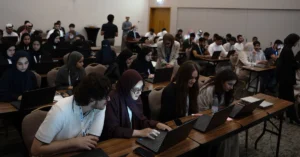Childhood is a remarkable phase of life, marked by growth, exploration, and learning. As parents, caregivers, and educators, understanding the foundations of childcare and learning is essential to provide children with the best possible start in life. In this comprehensive guide, we’ll delve into the key aspects of early childhood development, the role of caregivers, and the significance of creating nurturing environments for optimal learning.
The Crucial Role of Early Childhood Development
Early childhood is a period of rapid growth and development, both physically and cognitively. It lays the groundwork for a child’s future well-being and success. During these formative years, children’s brains are like sponges, soaking up knowledge and experiences that shape their understanding of the world around them.
Brain Development: Building the Foundation
In the first few years of life, a child’s brain undergoes remarkable growth and development. Neurons form connections, known as synapses, at an astonishing rate. These connections are the building blocks of learning, memory, and overall cognitive function. This underscores the importance of providing enriching experiences during early childhood, where a child’s brain is especially receptive to new information.
The Role of Caregivers in Early Childhood
Caregivers play a pivotal role in a child’s early years, influencing their emotional, social, and cognitive development. Whether parents, relatives, or early childhood educators, caregivers shape the child’s world and create the foundation for lifelong learning.
1. Responsive Care: Nurturing Emotional Intelligence
Babies and young children thrive in environments where their emotional needs are met. Responsive caregiving involves promptly attending to a child’s cues, whether it’s hunger, discomfort, or the need for comfort. By doing so, caregivers foster emotional intelligence, helping children learn to recognize and manage their own emotions while understanding the feelings of others.
2. Meaningful Interactions: Building Social Skills
Engaging in meaningful interactions with children is key to developing their social skills. Conversations, playtime, and shared activities help children learn to communicate, cooperate, and navigate social situations. These interactions also lay the groundwork for language development, as children learn new words and concepts through conversations with caregivers.
Nurturing Environments for Optimal Learning
Creating a nurturing environment is essential for supporting a child’s overall development and learning journey. A well-designed environment can stimulate curiosity, encourage exploration, and foster a lifelong love of learning.
1. Safe and Stimulating Spaces
Physical environments should be safe, inviting, and conducive to learning. This includes age-appropriate toys, books, and materials that encourage exploration and creativity. An environment that promotes active play and discovery supports both physical and cognitive development.
2. Routines and Consistency
Children thrive on routines and consistency. Predictable daily schedules provide a sense of security and help children develop a sense of time. Regular routines for activities like meals, naptime, and playtime also promote self-discipline and time management skills from an early age.
3. Encouraging Curiosity
Fostering curiosity is at the heart of early childhood learning. Encourage children to ask questions, explore their surroundings, and engage in hands-on activities. This not only ignites their innate sense of wonder but also builds problem-solving skills and a thirst for knowledge.
Caregivers, through responsive care and meaningful interactions, create the emotional and social bedrock upon which children build their understanding of the world. Nurturing environments further support this development, sparking curiosity and a lifelong love for learning. The integration of education and care in early learning Chatswood reflects the dedication to providing children with the best start in life. Remember, as parents, caregivers, and educators, you have the power to shape the journey of a child’s growth—one that will resonate for years to come.






